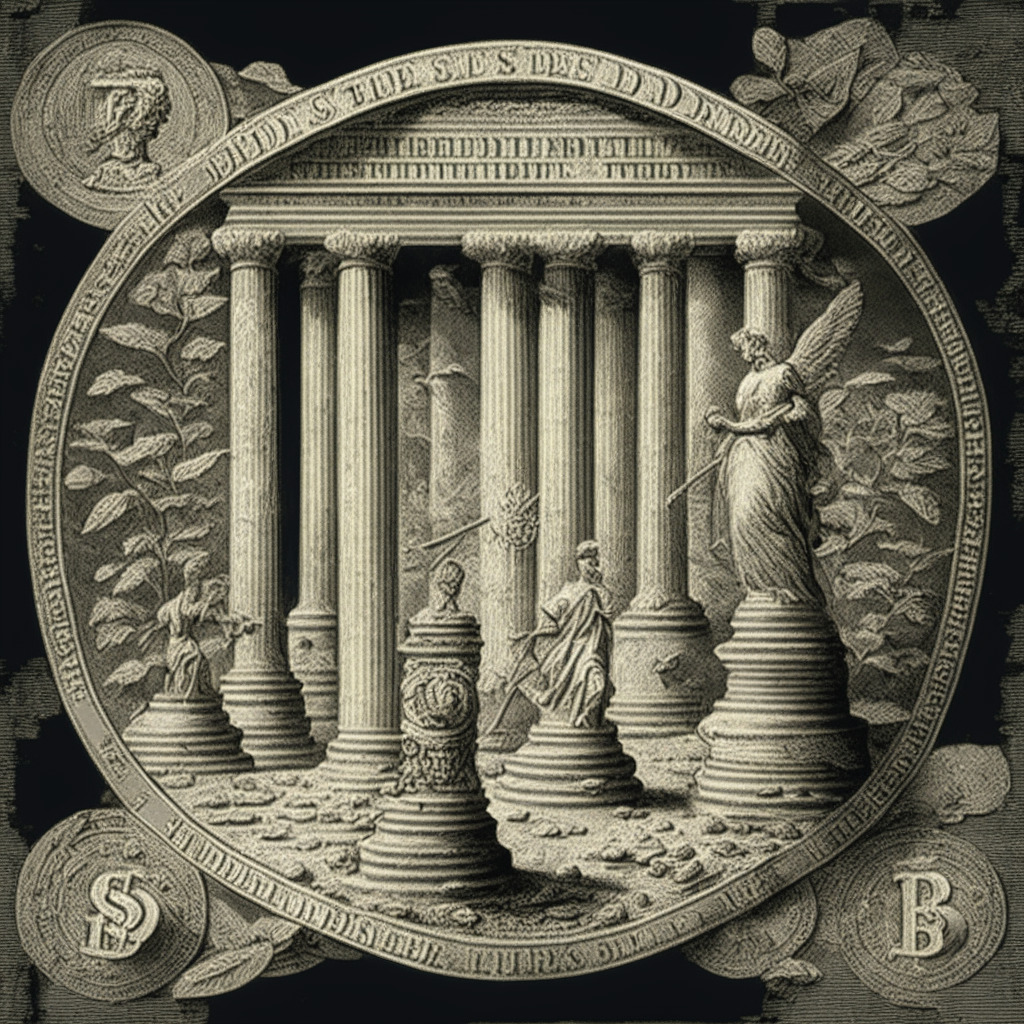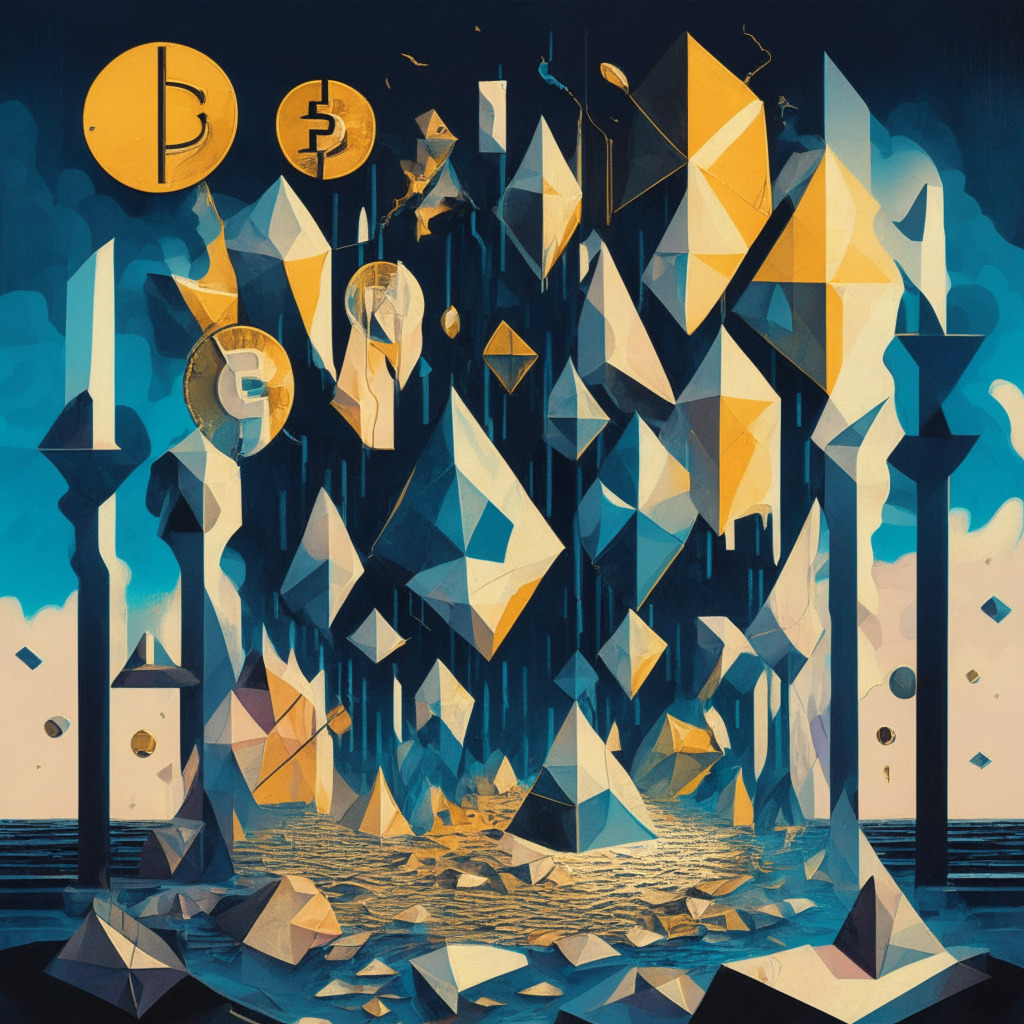Jeremy Allaire, CEO of Circle, highlights the need for fast progression of digital dollar and stablecoin development to preserve the vitality of the US dollar. In context of rising crypto adoption, he implies digital currencies potentially shaping future global commerce and payment protocols.
Search Results for: U.S
Navigating Global Regulatory Frameworks for Cryptocurrencies: A detailed Analysis & Perspective
“Regulatory frameworks are playing a crucial role in the crypto market, influencing price fluctuations. As nations worldwide compete to create clear crypto regulations, crypto regulatory clarity is transitioning from a luxury to a critical necessity for future growth.”
Stablecoins: The Potential Lifeline for US Dollar’s Global Dominance and The Challenge of Regulation
Stablecoins could potentially retain the global dominance of the U.S. dollar, countering “de-dollarization”. The authors express that with proper regulatory frameworks, stablecoins could reestablish the U.S. dollar’s role in international trade and provide relief for hyperinflation-affected economies.
Ethereum ETF Applications Outnumber Bitcoin: SEC Shuddering or Embracing Change?
Following a series of applications for Bitcoin (BTC) spot ETFs, 14 Ethereum futures ETF applications are now awaiting evaluation by the U.S. Securities and Exchange Commission (SEC). This wave of applications comes amidst rumors of the SEC’s readiness to support an Ether futures ETF, leading to companies reapplying only to find the approval far from guaranteed.
Potential SEC Approval of Bitcoin ETFs: Unlocking Major Upside or Triggering Downside Risks?
Matrixport suggests the SEC may approve several spot Bitcoin ETFs, triggering a potential surge in Bitcoin price. However, uncertainties regarding surveillance-sharing agreements may lead to a price correction. The report recommends investors have sufficient “upside exposure” during ETF application response periods.
Cryptocurrency Exchange Coin Launches Base Blockchain: A Game Changer or A Risk?
U.S. cryptocurrency exchange, COIN, has launched Base blockchain, a “layer 2 network” constructed on the Ethereum blockchain, potentially becoming a new revenue stream. Meanwhile, Rep. Maxine Waters expressed concerns about PayPal creating its own stablecoin without adequate federal laws. Futures activity indicates a stop to the Federal Reserve’s rate hikes due to the looming CPI release.
Inflation Rates and Their Impact on Crypto and Traditional Markets: A Guide to Understanding the CPI
The U.S. Consumer Price Index (CPI) data release could spotlight potential resurgence of inflation, affecting both traditional and crypto markets. The anticipated inflation rate easing could lead to a renewed confidence in risk assets, including Bitcoin. However, concerns of impending stagflation could disrupt conventional anticipations.
Biden’s AI Cyber Challenge: Boosting Cybersecurity or Brewing a Hacker’s Playground?
“The Biden administration recently launched the AI Cyber Challenge. With $20 million in rewards, this initiative aims to protect critical American infrastructure from cybersecurity threats. It brings together AI titans such as Anthropic, Google, Microsoft, and OpenAI, seeking their innovative AI applications to enhance cybersecurity.”
Regulatory Tango: Analysis of the SEC Vs. Ripple Labs and Future Implications on Crypto Regulations
The ongoing case between the SEC and Ripple Labs involves a potential $1.3 billion unregistered securities offering. Recently, Judge Analisa Torres ruled that Ripple’s XRP sales didn’t qualify as securities offerings. However, the SEC plans to appeal this decision, indicating the complex and evolving landscape of blockchain regulation.
Central Bank Digital Currency: A Financial Freedom Foe or Decentralized Ally?
Joe Rogan and Post Malone voiced skepticism about US central bank digital currency (CBDC), seeing it as potentially enabling government control over individual finances. This controversy, along with alternatives such as decentralized cryptocurrencies, forms a pivotal part of ongoing discussions about the future of digital currencies.
Navigating the Cryptoregulatory Waters: PayPal’s Launch of PYUSD Sparks Debate
“PayPal’s launch of its own stablecoin, PYUSD, brings the pressing issue of cryptocurrency regulation into focus. As cryptocurrencies integrate into mainstream financial services, there’s growing consensus on the need for a well-defined regulatory framework that can oversee these innovations while ensuring consumer protection and financial system integrity.”
SEC vs Ripple: Regulatory Storms and the Unwavering Crypto Market
“The ever-fluctuating crypto market demonstrates resilience, navigating through regulatory challenges and cybersecurity vulnerabilities. Recently, the SEC expressed intent to appeal the partial victory of Ripple’s XRP token. Despite such developments and inherent risks in the DeFi landscape, the ‘HODLing’ behaviour and initiatives from organizations like PayPal, Microsoft, and Aptos Labs reaffirm crypto’s stronghold in mainstream finance.”
Pivotal Ripple Vs SEC Case: Decoding Effects on Blockchain Regulations & Future Impacts
“The SEC is seeking an appeal against a court ruling relating to Ripple Labs. This could influence other pending cases, causing potential discrepancies in rulings across jurisdictions. The inconsistencies of US crypto regulations on a global scale are highlighted; while SEC classifies most cryptocurrencies as securities, other regulators class them as property. This ambiguity is causing uncertainty among investors and companies, emphasizing the need for clearer, consistent regulations.”
Chasing Shadows and Rainbows: Blockchain Challenges and Triumphs Unveiled
U.S. crypto exchange Coinbase has unveiled its new Ethereum layer-2 network, Base, potentially causing shifts in the blockchain landscape. Meanwhile, the sector faces challenges around credibility of newly launched stablecoins, possible regulation, and risks from open-source code misuse. Despite these, crypto initiatives continue to grow globally, suggesting a maturing industry.
SEC’s Appeal in Ripple’s XRP Case: A Regulatory Tug-of-War Shaking Crypto World
“The SEC plans to file an appeal on a ruling regarding Ripple’s XRP sales, potentially saving multiple trials. This regulatory tug-of-war has brought Ripple’s sales to both institutional and retail investors under scrutiny. The judgement sets an intriguing precedent for the world of crypto exchanges and the course of cryptocurrency.”
The Clash Over PayPal’s Stablecoin: Balancing Innovation and Regulation
“The U.S. House Financial Services Committee offers contrasting viewpoints on PayPal’s U.S. dollar-pegged stablecoin, PYUSD. While Rep. Maxine Waters expresses concern about regulatory oversight, Rep. Patrick McHenry proposes potential in its development. The struggle between fostering innovation and ensuring safety shows the complex challenges of the crypto industry.”
PayPal’s Landmark Blockchain Shift with PYUSD: Door to the Future or Just Hype?
“PayPal’s landmark launch of PYUSD marks a shift in crypto space, indicating global integration of blockchain technology. PYUSD allows individuals to transfer funds globally, enabling broader adoption of blockchain for safer, quicker, affordable transactions. Despite initial apprehensions, PayPal’s venture may catalyze unprecedented change in existing financial systems.”
Bridging Galaxies: CBS’ Star Trek Jumps into NFT Universe Amid Legal Complexities
“Star Trek Continuum, a line of NFTs featuring various starships from the franchise, has gained U.S approval. As traditional entities enter digital assets, navigating legal landscapes and understanding blockchain technology and security becomes essential. While propelling change in art and media, this space also carries complexities not to be overlooked.”
PayPal’s Plan for Issuing Stablecoin: A Bold Gamble or an Interest Earning Strategy?
PayPal plans to issue a U.S. dollar stablecoin, PYUSD, on the Ethereum network. Expected to enhance PayPal’s revenue stream, PYUSD’s underpinning structure includes earning interest on financial holdings. Through PYUSD, PayPal’s user balances can accrue interest, especially if interest rates increase, extending a revenue opportunity for the company.
Navigating SEC Exemptions in Blockchain: A Deeper Dive into Maple Finance’s Achievement and DeFi Risks
This article explores the landscape of blockchain regulations, focusing on Maple Finance’s recent exemption from SEC regulations. It highlights the growth of the DeFi sector, constant market opportunities, network vulnerabilities and the importance of security and regulatory compliance. The piece also discusses the qualification for individual investors in the U.S.
Inflation Data Impact on Crypto Markets: Stablecoins as a Stabilizer vs Small Cap Coin Volatility
“The cryptosphere is experiencing market anxiety due to the U.S Consumer Price Index inflation data, impacting market dynamics significantly. While Bitcoin and Ethereum display positive trading bias, failure to surpass resistance levels evidences concern. Market stabilization is being supported by optimism around Paypal’s stablecoin, which could simplify fiat to crypto exchange.”
Emerging Trust in Bitcoin: Financial Giants are Getting Onboard with Cryptocurrency
David Rubenstein, founder of the Carlyle Group, expressed confidence in Bitcoin’s future and its increasing importance in financial assets. His views underscore the growing interest from major firms in Bitcoin and its acceptance as a regulation-free virtual currency.
Gearing up for the Digital Ruble Era: Russia’s CBDC Revolution Amid Economic Sanctions
Russia’s central bank digital currency (CBDC), the digital ruble, is entering a testing phase with real-world trials through 13 banks. This advancement could potentially sidestep Russia’s current financial challenges and reshape the nation’s digital currency future, despite risks such as cyber threats and potential declines in physical currency demand.
Crypto Market and Economic Impacts: How the CPI, Federal Reserve Moves and Inflation Rate Shape the Future
The crypto community anticipates the economic impacts of the upcoming Consumer Price Index release, which will likely influence Bitcoin and other cryptocurrencies’ value. Additionally, the Federal Reserve plans to supervise banks’ crypto-related activities through dedicated digital asset experts, aiming to ensure safe and sound operations. Meanwhile, Binance has acquired operation licenses in El Salvador to bolster its global legitimacy.
Surge in Blockchain-Based T-Bill Offerings: A Financial Boom or Hidden Risk?
Maple Finance, a blockchain-based credit marketplace received a green light to open its cash management pools for U.S. investors. This opens opportunities for investors to park their stablecoin holdings in one-month U.S. Treasury bills, earning a 4-5% annual yield. While the crypto ecosystem appreciates the opportunities, concerns loom over potential risks.
Massive Stablecoin Growth Predicted: 2140% Rise Expected but Regulatory Challenges Loom
An astronomical surge in the stablecoin market is projected, with a 2140% increase from $125 billion to $2.8 trillion, driven by greater integration with consumer platforms. Increased collaborations between global financial and consumer platforms to release their co-branded stablecoins are anticipated. However, the challenge of stablecoin regulation persists.
Bitcoin’s Quest for $30K: Regulatory Clarity, Volatility, and an Unforeseen Crypto Market Boom
“Bitcoin shows robust performance despite the volatile cryptocurrency market, outperforming crypto hedge funds. Bybit’s Vivien Fang cites a record low in Bitcoin’s volatility, anticipating a rebound. However, unpredictability remains possible due to macro-related downside events and speculative trading, underscoring the critical role of regulatory clarity.”
Coinbase’s New Blockchain Adventure: Pioneering Success or Icarian Flight?
U.S. crypto exchange Coinbase is set for the launch of its new Base blockchain, a ‘layer 2’ platform built on Ethereum. With $133 million already locked into the base network, Coinbase aims to promote blockchain accessibility and innovation. The firm faces regulatory and user-safety challenges, but remains committed to creating trusted experiences for users and fostering global decentralization.
Implications of US XRP Ruling on South Korea’s Terraform Labs’ LUNC Token Controversy
A recent US court ruling declared Ripple’s XRP token as “not a security.” This decision may pose challenges for South Korean prosecutors in their case against Do Kwon and Terraform Labs over securities violations and fraud. The ruling highlights the complexity of classifying crypto assets and raises questions about the future of cryptocurrency regulation globally.
The Great Swindle: FTX’s Co-CEO’s Guilty Plea and Its Fallout on Crypto Transparency
Former co-CEO of FTX Digital Markets, Ryan Salame, is expected to plead guilty to suspected violations of U.S. campaign finance laws linked with illicit activities within the cryptocurrency firm. Sam Bankman-Fried, FTX founder, maintains his not guilty plea against charges including multi-billion dollar fraud. This underscores the urgent need for transparency in financial cyberspace.
Federal Reserve’s Crypto Oversight: Balancing Innovation and Regulation
The U.S. Federal Reserve is extending oversight of banks involved in the crypto and blockchain sector with the Novel Activities Supervision Program. It aims to balance innovation with risk management, covering crypto-related services including custody, lending, and trading. This move raises questions about the intersection of banking, regulations, and the emerging crypto domain which could shape blockchain’s future.
Billionaire’s Belief in Bitcoin’s Bright Future: Revisiting Skepticism amidst Institutional Embrace
David Rubenstein, billionaire and co-chairman of Carlyle Group, recently expressed his belief that Bitcoin is here to stay, largely due to increasing institutional interest. He uses BlackRock’s plans to introduce a Bitcoin ETF as a primary example, suggesting the growing attention towards cryptocurrencies may lead sceptics to reconsider their stance.































